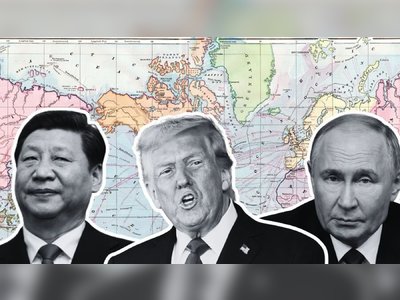Trump Sets Conditions for Eliminating Tariffs on EU Goods
The U.S. President emphasizes trade deficits and energy purchases in negotiations with the European Union.
U.S. President Donald Trump has rejected the European Union's proposal to eliminate tariffs entirely, arguing that the removal of tariffs should be contingent on addressing the existing trade deficit, which he states amounts to $350 billion with the EU. Trump suggested that the EU could quickly rectify this by purchasing U.S. liquefied natural gas and oil equivalent to this deficit, asserting that this approach could facilitate a swift resolution to tariff issues.
He stated, 'They can solve it quickly, just by buying American gas and oil to the same value.' Despite Trump's assertions regarding the significance of the trade deficit, numerous economic analysts worldwide have indicated that this rationale does not adequately justify the imposition of tariffs.
Since Trump's inauguration, European Commission President Ursula von der Leyen had indicated that the EU might increase its purchases of U.S. liquefied natural gas.
However, reports indicate that the EU has yet to receive a formal response from the White House detailing how such an agreement would be operationalized.
Trump has also criticized EU regulations, labeling them as non-tariff barriers that inhibit U.S. product sales in EU markets.
He claimed, 'They’re creating rules and regulations designed for one reason: so you can’t sell your product in those countries.
And we’re not going to allow that.'
In a recent statement on the social media platform TruthSocial, Trump conveyed optimism regarding a 'big deal' between the U.S. and South Korea, suggesting that negotiations could yield significant bilateral agreements.
South Korea's acting President Han Duck-soo expressed his willingness to negotiate tariff reductions, while noting that South Korea does not plan to align with China, Japan, or other countries against U.S. tariffs, which have unsettled global markets and raised recession fears.
Economic analysts have indicated substantial financial impacts resulting from these tariffs.
According to the latest edition of the Macroeconomic Analysis and Trends bulletin, stock markets around the world experienced sharp declines, with oil prices, typically a barometer of economic activity, falling by approximately 14 percent, marking the lowest level in nearly four years.
This has intensified concerns regarding a potential global economic slowdown.
The economic consequences of reciprocal tariffs have been substantial, with estimates suggesting that U.S. tariff revenue could reach €81 billion in contrast to €7 billion by 2024, contingent on maintaining current trade levels.
However, analysts predict a decline in reciprocal trade due to newly imposed tariffs.
The European Central Bank has indicated that U.S. tariffs on European imports, coupled with retaliatory measures from the EU, could reduce the growth rate of the Eurozone's GDP by about half a percentage point.
This estimation represents a significant correction to previous growth forecasts.
Trump’s recent tariff policies have also resulted in notable decreases in his personal wealth, with reports indicating a decline from $4.7 billion to $4.2 billion over a week.
The drop is reportedly attributed to falling stock values in the Trump Media and Technology Group and substantial reductions in his real estate portfolio.
In response to the tariffs, prominent companies have begun to alter their export strategies.
German automaker Audi announced a temporary suspension of vehicle exports to the U.S. due to the new tariffs, reflecting broader concerns within the automotive industry regarding the financial implications of U.S. tariff policies.
Audi's spokesperson confirmed that vehicles already in transit would be retained at delivery locations.
Trump's administration had previously imposed a 25 percent tariff on all automobiles manufactured outside the U.S., with plans to extend this burden to numerous categories of auto parts starting in May. As Trump continues to levy significant tariffs on various trade partners, including a recent escalation involving China, analysts caution that the longer-term economic impact of these measures will be closely monitored by global markets.
He stated, 'They can solve it quickly, just by buying American gas and oil to the same value.' Despite Trump's assertions regarding the significance of the trade deficit, numerous economic analysts worldwide have indicated that this rationale does not adequately justify the imposition of tariffs.
Since Trump's inauguration, European Commission President Ursula von der Leyen had indicated that the EU might increase its purchases of U.S. liquefied natural gas.
However, reports indicate that the EU has yet to receive a formal response from the White House detailing how such an agreement would be operationalized.
Trump has also criticized EU regulations, labeling them as non-tariff barriers that inhibit U.S. product sales in EU markets.
He claimed, 'They’re creating rules and regulations designed for one reason: so you can’t sell your product in those countries.
And we’re not going to allow that.'
In a recent statement on the social media platform TruthSocial, Trump conveyed optimism regarding a 'big deal' between the U.S. and South Korea, suggesting that negotiations could yield significant bilateral agreements.
South Korea's acting President Han Duck-soo expressed his willingness to negotiate tariff reductions, while noting that South Korea does not plan to align with China, Japan, or other countries against U.S. tariffs, which have unsettled global markets and raised recession fears.
Economic analysts have indicated substantial financial impacts resulting from these tariffs.
According to the latest edition of the Macroeconomic Analysis and Trends bulletin, stock markets around the world experienced sharp declines, with oil prices, typically a barometer of economic activity, falling by approximately 14 percent, marking the lowest level in nearly four years.
This has intensified concerns regarding a potential global economic slowdown.
The economic consequences of reciprocal tariffs have been substantial, with estimates suggesting that U.S. tariff revenue could reach €81 billion in contrast to €7 billion by 2024, contingent on maintaining current trade levels.
However, analysts predict a decline in reciprocal trade due to newly imposed tariffs.
The European Central Bank has indicated that U.S. tariffs on European imports, coupled with retaliatory measures from the EU, could reduce the growth rate of the Eurozone's GDP by about half a percentage point.
This estimation represents a significant correction to previous growth forecasts.
Trump’s recent tariff policies have also resulted in notable decreases in his personal wealth, with reports indicating a decline from $4.7 billion to $4.2 billion over a week.
The drop is reportedly attributed to falling stock values in the Trump Media and Technology Group and substantial reductions in his real estate portfolio.
In response to the tariffs, prominent companies have begun to alter their export strategies.
German automaker Audi announced a temporary suspension of vehicle exports to the U.S. due to the new tariffs, reflecting broader concerns within the automotive industry regarding the financial implications of U.S. tariff policies.
Audi's spokesperson confirmed that vehicles already in transit would be retained at delivery locations.
Trump's administration had previously imposed a 25 percent tariff on all automobiles manufactured outside the U.S., with plans to extend this burden to numerous categories of auto parts starting in May. As Trump continues to levy significant tariffs on various trade partners, including a recent escalation involving China, analysts caution that the longer-term economic impact of these measures will be closely monitored by global markets.
AI Disclaimer: An advanced artificial intelligence (AI) system generated the content of this page on its own. This innovative technology conducts extensive research from a variety of reliable sources, performs rigorous fact-checking and verification, cleans up and balances biased or manipulated content, and presents a minimal factual summary that is just enough yet essential for you to function as an informed and educated citizen. Please keep in mind, however, that this system is an evolving technology, and as a result, the article may contain accidental inaccuracies or errors. We urge you to help us improve our site by reporting any inaccuracies you find using the "Contact Us" link at the bottom of this page. Your helpful feedback helps us improve our system and deliver more precise content. When you find an article of interest here, please look for the full and extensive coverage of this topic in traditional news sources, as they are written by professional journalists that we try to support, not replace. We appreciate your understanding and assistance.











